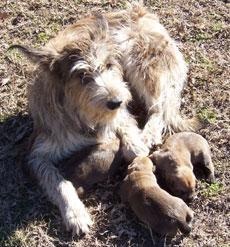DNA Research Opportunity for Picards
Only a few short years ago, sequencing the entire genome of an individual was only remotely possible, and extremely expensive. The prospect would cost millions and take months – and at the end, there were few tools to handle all the data collected.
 The tools available for genetic research have made enormous leaps forward just in recent years & months.The Animal Molecular Genetics Laboratory at the University of Missouri-Columbia now has the capability to run a Whole Genome Sequence (WGS) for an individual dog in a matter of weeks, and at a cost far less than could have been imagined a few years ago. Thanks to collaboration with researchers working on cattle genetics from the Animal Science department on the UMC campus, the tools are now available to wade through the mountain of data, and identify mutations that may be responsible for inherited diseases found in the sequenced dogs. Just in the past few months, this new technique has been used to identify mutations responsible for a fatal kidney malfunction in Basenjis, a Parkinson-like syndrome in Kerry Blue Terriers and Chinese Cresteds, and a severe ataxia (inability to coordinate movement) in Jack/Parson/Russell Terriers. WGS data is being evaluated from several more individuals from multiple breeds for a variety of neurologic, ophthalmic, and cardiac conditions. It is a very exciting time for genetic research of inherited diseases in dogs!!
The tools available for genetic research have made enormous leaps forward just in recent years & months.The Animal Molecular Genetics Laboratory at the University of Missouri-Columbia now has the capability to run a Whole Genome Sequence (WGS) for an individual dog in a matter of weeks, and at a cost far less than could have been imagined a few years ago. Thanks to collaboration with researchers working on cattle genetics from the Animal Science department on the UMC campus, the tools are now available to wade through the mountain of data, and identify mutations that may be responsible for inherited diseases found in the sequenced dogs. Just in the past few months, this new technique has been used to identify mutations responsible for a fatal kidney malfunction in Basenjis, a Parkinson-like syndrome in Kerry Blue Terriers and Chinese Cresteds, and a severe ataxia (inability to coordinate movement) in Jack/Parson/Russell Terriers. WGS data is being evaluated from several more individuals from multiple breeds for a variety of neurologic, ophthalmic, and cardiac conditions. It is a very exciting time for genetic research of inherited diseases in dogs!!

We have the opportunity to use this new technique to try to solve some known issues in Picards, if funds can be raised. The total cost to run and evaluate a WGS for one dog is $7000. While this may be a fairly large sum for one individual, as research funding goes it is a very small amount. At present, we have an ideal sample ready to run from a Picard diagnosed with Canine Multifocal Retinopathy (CMR). If enough funds can be raised, there are two Picards already sampled that are diagnosed with Progressive Retinal Atrophy (PRA). One of these dogs was diagnosed young (3-4yrs of age), one was diagnosed much later (8-9yrs). The AMGL proposes to run WGS on the early onset dog first, and it may or may not be necessary to sequence the second dog. If there are other conditions identified in Picards, and an appropriate individual dog can be sampled, other issues can be investigated as well, as sufficient funds are raised.
Please understand that there are no guarantees with scientific research – it is possible that the research team won’t immediately find the mutation they’re looking for. However, once the dog is sequenced, that data can be re-analyzed with ever-improving tools. Prospects are brighter than ever before, but it is still possible to come up empty, and it is important for all donors to understand this.

This is an exciting opportunity to attempt to solve an issue known in Picards. Please consider what you can contribute to the project. Donations should be made to the BPCA Health Fund in any amount you feel you can contribute. As soon as we near the required amount, we will give the research team the green light to proceed with sequencing.
